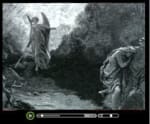Reincarnation
Reincarnation: Its Background
Reincarnation comes from the Hindu-buddhist philosophy of soul transmigration. This is the "religious" concept of the eternal birth-death-birth cycle, where a soul moves from body to body. The status of each successive body, whether human or animal, is the direct result of the quality of the life the soul led in the previous body. Thus, a "good" life results in rebirth to a higher quality form, and a "bad" life results in rebirth to a lower quality form. This forward and backward progression is based on the Law of Karma, a central foundation of Hinduism and other Eastern-based philosophies. As most of us know, Karma teaches that good deeds are rewarded and bad deeds are punished. The ultimate goal in this Karma cycle is for the soul to progress to the highest level of existence and become one with the universe. Reincarnation is taught side-by-side with pantheism, the belief that everything is God and God is in everything. Reincarnation and pantheism are the central doctrines of Hinduism and occultism, variations of which have grown popular in the Western world in recent decades.
Reincarnation: Its Impact on Western Thought
Reincarnation appeals to Western "religious" thinking, such as the New Age philosophies, because the life cycle concept provides people with unlimited chances to get life right. With reincarnation, we have no imminent or compelling reason to figure out the meaning of life with respect to God and fellow man. We can feel our way through existence, and, if need be, "get it right in the next life." Remarkably, recent surveys reveal that nearly 60% of Americans believe reincarnation is possible. Not only has reincarnation entered Western thought through various New Age teachings, reincarnation has surfaced in the Christian church and certain "Christian" variants. Actually, the Bible is sometimes cited to support a belief in reincarnation, or at least the possibility that reincarnation can coexist with Christianity. The remainder of this piece will address four biblical citations used by reincarnationists to support this misguided doctrine.
Reincarnation: Its Misuse in Christianity and Elsewhere
Reincarnation in Matthew 11:14: Reincarnationists cite Jesus' statement in Matthew 11:14 that John the Baptist was Elijah. However, this is not the complete context of the scripture. Luke 1:17 tells us that John the Baptist would precede Christ "with the spirit and power of Elijah." In addition, John the Baptist himself denied that he was Elijah in John 1:21. We must also remember that Old Testament scripture teaches that Elijah never experienced physical death (2 Kings 2:11). This fact is again stressed in the New Testament when Elijah appears with Moses at the Mount of Transfiguration (Matthew 17:3).
Reincarnation in John 3:3: Jesus tells Nicodemus that to see the Kingdom of God one must be "born again." Here, many reincarnationists declare that Jesus is supporting the idea that a series of rebirths is necessary to achieve life cycle "perfection." Of course, one must read the entire passage to understand the complete context. When Nicodemus expresses his bewilderment about a second physical birth, Jesus immediately sets Nicodemus straight. In John 3:4-5, Jesus specifically refutes the concept of physical rebirth, and is very clear in stating that this "rebirth" is a spiritual one.
Reincarnation in John 9:1-3: This scripture tells of a man born blind and deals with the question of whose sin was the cause of his blindness. Reincarnationists say this biblical question is in line with the Law of Karma. However, the scripture does not end with this question. Rather, it ends with the reply of Jesus -- that the man's blindness was in no way related to sin. Therefore, we see no connection whatsoever with any Karma-like doctrine.
Reincarnation in Hebrews 7:2-3: Reincarnationists maintain that this scripture portrays Jesus as Melchizedek in a previous incarnation. However, a very simple review of the scripture will show that Melchizedek was "made like unto the Son of God," not that he was the Son of God, Jesus Christ. The scripture merely says that there is no record of Melchizedek's birth or death, and that his unique priest-hood was not transferable to another. Melchizedek is only being compared to Jesus, not being declared a previous incarnation of Him.
Reincarnation: What the Bible Does Say
Hebrews 9:27 clearly refutes the doctrine of reincarnation -- "it is appointed for men to die once, and after this comes judgment." Simply stated, reincarnation is not compatible with Christian doctrine. In fact, the Bible clearly teaches that the wages of sin is death (Romans 6:23). Reincarnation is the same deception used by Satan in the Garden of Eden when he told Eve, "You surely shall not die." The Bible teaches that eternal salvation from sin is a gift from God through Jesus Christ. Reincarnation is a myth, which teaches that "salvation" will ultimately come to those who have perfected themselves at the end of their Karma-based life cycle.
What is your response?



